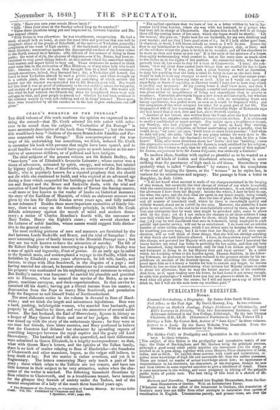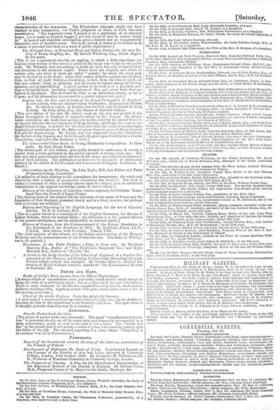PUBLICATIONS RECEIVED.
Boom.
Emanuel Swedenborg; a Biography. By James John Garth Wilkinson. Ned Allen; or the Past Age. By David Hannay, Esq. In two volumes. Prefections on Butler's Analogy, Paley's Evidences of Christianity, and Hill's Lectures in Divinity. With two Introductory Lectures, and four
Addresses delivered in the New College, Edinburgh. By the late Thomaa
Chalmers, D.D., LL.D. (Chalmers's Posthumous Works, Volume IL) Shirley; a Tale. By Currer Bell, Author of "Jane Eyre." In three volumes. Letters to is Lady. By the Baron Wilhelm Von Humboldt. From the
German. With an Introduction by Dr. Stebbing.
The Golden Calf; or Prodigality and Speculation in the Nineteenth Cen- tury. In three volumes. [The subject of this fiction is the prodigality and speculative mania of our day; the Duke of Buckingham and Mr. Hudson being the principal persons, although a good many other public notables are introduced into the story, or hitched in as it goes along, together with some Minerva Press characters of lords, ladies, and so forth. To exhibit these matters with truth and naturalness, re quires more knowledge of high life and mercantile life than the author possesses. There are indeed no marks of actual knowledge about him; no appearance of vraisemblance in his incidents, his characters, or his dialogues, though he now and then throws in some reported anecdote to give a likelihood of detail. There is some smartness in the writing, and some pungency in hitting off the palpable public traits of public men. The beat thing of this kind is a sketch of Mr. Disraeli.] Herman and Dorothea. Translated into English Hexametera, from the Ger- man Hexameters of Goethe. With an Introductory Essay. [Whatever may be the effect of the hexameter in German, this translation Of Goethe's story does not differ from other attempts to naturalize that species of versification in English. Unconscious parody, and prosaic verse, are ever the characteristics of the hexameter. The Elizabethan attempts might not have reached to true hexameters, but Nash's judgment on them, in 1592, was true nevertheless. "The herametir verse I graunt to be a gentleman of an auncient house, (so is many an English bugger,) yet this clyme of ours he cannot thriue in." A learned and elaborate introduction gives a history and an exaggeratedly favourable view of Goethe's poem. The book, indeed, is rather to be looked on as a labour of personal love than as a work of public requirement.]
The Rod and Line; or Practical Hints and Dainty Devices for the sure Ta- king of Trout, Grayling, &c. By Hewett Wheatley, Eel., Senior Angler. In five parts.
[This is not a systematic treatise on angling, in which a little experience (or mayhap none worthy of the name) is added to the many text-books on the gentle craft. Mr. Wheatley does not attempt to teach the tyro, but only to furnish hints and directions to the advanced angler. These hints are original, and relate to various arts, and what in trade are called " secrets," by which the finny prey may be tricked on to the hook; albeit their author declaims against certain prac- tices, as float or; night fishing,-discarding, in fact, from the idea of sport, all fish save salmon, trout, or grayling, and all modes of capture except fly-fishing, spinning, and ground-fishing. A great portion of the book is of a practical, per- haps a technical kind; involving explanations of flies and other baits that are figured in the plates. The Rod and the Line is an informing volume, so far as it goes; and its information is conveyed in a quaint independent style.]
Inquiry into the Rise and Growth of the Royal Prerogative in England. A new edition, with the Author's latest Corrections, Biographical Notices, &c. To which is added, an Inquiry into the Life and Character of King Eadwig. By John Allen, Esq., late Master of Dulwich College.
[This new edition of the late Mr. Allen's essay on the rise and growth of the Royal Prerogative in England is capitally edited by Mr. Thorpe. Mr. Allen's latest corrections are made from a copy lent to the editor by the author himself; an inquiry into the life and character of King Eadwig, exhibiting the state of the Anglo-Saxon clergy, is printed for the first time from the author's manuscripts; biographical reminiscences of Mr. Allen are given from the pens of Major-General Fox and Sir James Craig. Mr. Thorpe has also reprinted from the Edinburgh the Review of the Inquiry, and M. Berrenger's Rapport upon Paul Guillot's French Translation, read before the Academy in 1834.]
The Commercial Class-Book; or Yonng Merchant's Compendium. In three parts. By John Henry Freese. [The second part of this volume, principally devoted to exchanges, is mostly a reprint from a work published by the author upwards of twenty years ago. The first and third parts contain brief outlines of the nature and subjects of commerce and of book-keeping. The publication professes to be the course of instruction pursued by the author in his Classical and Commercial Collegiate Institution in Brazil.] Observations on the Weather. By John Toplis, B.D., late Fellow and Tutor of Queen's College, Cambridge. [A collection of facts relating to the atmosphere, the temperature, the winds and dectricity, with a variety of prognostics concerning the weather. The hook is rather a summary of what is already known upon the subject, than an additional contribution to our original knowledge, either of fact or theory.] History of the Discovery of America, written expressly for Children. Trans- lated from the French of Lame Fleury. [The leading facts of the subject till the discovery of the mines of Potosi and the foundation of New England, presented clearly and in a lively manner, but perhaps with a vivacity too artificial.] History and Etymology of the English Language, for the use of Classical Schools. By R. G. Latham, M.D. [This to a great extent is a counterpart of the English Grammar, for the use of Ladies' Schools, which we noticed lately: the difference is in the greater fulness of the present abridgment, and its adaptability to classical pupils.] History of Europe, from the Commencement of the French Revolution to the Restoration of the Bourbons in 1815. By Archibald Alison, LL.D., F.R.S.E. New edition, with Portraits. Volume VIII.
[The chief subjects of this volume are the Indian administation of the Marquis "Wellesley and the commencement of the Peninsular war. The Dake of Welling. ton is the portrait.] Trevanion, or the False Position; a Play, in three acts. By Westland Marston, Esq., Author of " The Patrician's Daughter," &c.; and Bayle Bernard, Esq., Author of "Lucille," &c.
A Guide to the Daily Service of the Church of England; or a Popular Ex- planation of the Morning and Evening Prayers daily throughout the year. Second edition, revised and enlarged. By Thomas Stephen, Medical Li- brarian of King's College, London; Author of "An Ecclesiastical History of Scotland," &e.
PRINTS AND MAPS.
Battle of Dolly's Brae, as seen from the Hill of Maghermayo. [A rough sketch of the notorious scene, possessing small artistic merit except as being the work of a self-taught artist ; but as a diagram of the spot it is curious. There is some character in the Riband ragamuffins,-big-hatted, slack-coated, dndheen-smoking-who, regularly armed with guns, stand under cover to fire at the passing procession.] Chart of the Arctic Regions. From the Admiralty Surveys. [A clear map of a region rendered specially interesting just now, by the doubts re- specting the fate of the expeditions under Franklin and Ross. The spot where it is thought probable that they may lie is marked.] AradAwAcx.
Punch's Pocket-book, for 1850.
[The prince of pocket-books and almanacks. The usual "miscellaneous informa- tion" is presented clearly, set off by comic cute, and frequently accompanied by a terse commentary, going at once to the pith of the subject. The " mirth and fan" in the second part is not merely a series of jokes, but a running parody upon the follies of the day. The coloured engraving is a scene where " everything is in common "-a hit at Communism.]
PAMPHLETS.
Report of the Seventeenth Annual Meeting of the Literary Association of the Friends of Poland.
Development of Difference the Basis of Unity. Introductory Lecture to the Courses of the Faculty of Arts and Laws, delivered in University College, London, 16th October 1849. By Alexander W. Williamson, Ph. D., Professor of Practical Chemistry in University College, London.
The Judgment of Charity. A Plea for the Hypothetical Interpretation of the Baptismal Services of the Church of England. By Thomas Vores, M.A., Perpetual Curate of St. Mary's in the Castle, Hastings, &e.



























 Previous page
Previous page